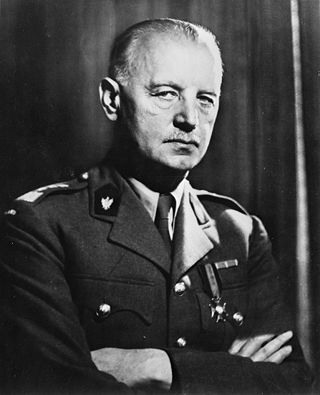
Władysław Eugeniusz Sikorski was a Polish military and political leader.

The Polish Workers' Party was a communist party in Poland from 1942 to 1948. It was founded as a reconstitution of the Communist Party of Poland (KPP) and merged with the Polish Socialist Party (PPS) in 1948 to form the Polish United Workers' Party (PZPR). From the end of World War II the PPR led Poland, with the Soviet Union exercising moderate influence. During the PPR years, the centers of opposition activity were largely diminished, and a socialist system was established in the country.
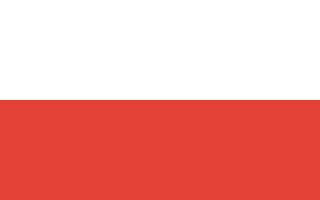
The Polish government-in-exile, officially known as the Government of the Republic of Poland in exile, was the government in exile of Poland formed in the aftermath of the Invasion of Poland of September 1939, and the subsequent occupation of Poland by Germany, the Soviet Union, and the Slovak Republic, which brought to an end the Second Polish Republic.

Marek Marian Belka is a Polish professor of economics and politician who has served as Prime Minister of Poland and Finance Minister of Poland in two governments. He is a former director of the International Monetary Fund's (IMF) European Department and former Head of Narodowy Bank Polski. He has served as a Member of the European Parliament (MEP) since July 2019.

Gazeta Wyborcza is a Polish nationwide daily newspaper based in Warsaw, Poland. It was launched on 8 May 1989 on the basis of the Polish Round Table Agreement and as a press organ of the trade union "Solidarity" in the election campaign before the Contract Sejm. Initially created to cover Poland's first partially free parliamentary elections, it rapidly grew into a major publication, reaching a circulation of over 500,000 copies at its peak in the 1990s.

Janusz Jędrzejewicz was a Polish politician and educator, a leader of the Sanacja political group, and 24th Prime Minister of Poland from 1933 to 1934.
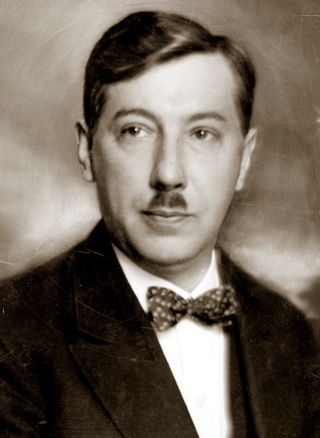
Eugeniusz Kwiatkowski was a Polish politician and economist, Deputy Prime Minister of Poland, government minister and manager of the Second Polish Republic.

Rzeczpospolita is a Polish nationwide daily economic and legal newspaper, published by Gremi Media. Established in 1920, Rzeczpospolita was originally founded as a daily newspaper of the conservative Christian National Party during interwar Poland. The paper's title is a translation of the Latin phrase res publica, and is part of the traditional and official name of the Polish state, "Rzeczpospolita Polska."

Aleksander Józef Skrzyński was a Polish politician from Zagórzany, Galicia, who served as the 13th Prime Minister of Poland from 1925 to 1926.

Antoni Józef Ponikowski was a Polish academician and politician who served as 7th Prime Minister of Poland in 1918 and from 1921 to 1922.
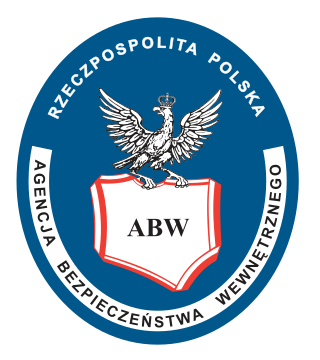
The Internal Security Agency is Poland's domestic counterintelligence and security agency. The ABW is responsible for analyzing, reporting and preventing threats to Poland's internal security, including terrorism, foreign espionage, arms smuggling, drug trafficking, organized crime, corruption and economic coercion. Its powers include arresting individuals, conducting searches and investigations, and combating terrorism with a specialized armed anti-terrorist force.

The Provisional Government of the Republic of Poland was created by the State National Council on the night of 31 December 1944.

The Provisional Government of National Unity was a puppet government formed by the decree of the State National Council on 28 June 1945 as a result of reshuffling the Soviet-backed Provisional Government of the Republic of Poland established by the Polish Workers' Party through inclusion of politicians from the close political sphere of Stanisław Mikołajczyk, the former prime minister of the Polish government-in-exile based in London. Inclusion of the latter group provided an excuse for the Western allies to approve tacitly the fait accompli of Poland becoming part of the Soviet sphere of influence, and to legitimise the Warsaw government while withdrawing their recognition of the Polish government-in-exile.
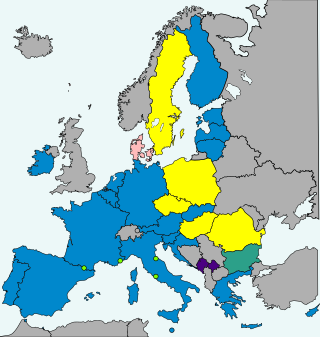
Poland does not use the euro as its currency. However, under the terms of their Treaty of Accession with the European Union, all new Member States "shall participate in the Economic and Monetary Union from the date of accession as a Member State with a derogation", which means that Poland is obliged to eventually replace its currency, the złoty, with the euro.

The Ministry of Public Security, was the secret police, intelligence and counter-espionage agency operating in the Polish People's Republic. From 1945 to 1954 it was known as the Security Office, and from 1956 to 1990 as the Security Service.

Dziennik Ustaw or Dziennik Ustaw Rzeczypospolitej Polskiej is the most important Polish publication of legal acts. It is the only official source of law for promulgation of Polish laws. The publication of this journal is solely the responsibility of the Prime Minister of the Republic of Poland. 'Dziennik Ustaw' traces its history to the 1918 'Dziennik Praw Królestwa Polskiego' and has changed its name several times during its existence.

Polski Słownik Biograficzny is a Polish-language biographical dictionary, comprising an alphabetically arranged compilation of authoritative biographies of some 25,000 notable Poles and of foreigners who have been active in Poland – famous as well as less-well-known persons – from Popiel, Piast Kołodziej, and Mieszko I, at the dawn of Polish history, to persons who died in the year 2000.
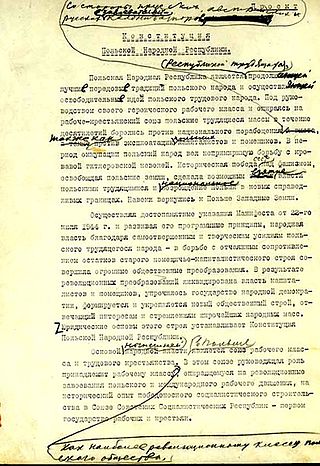
The Constitution of the Polish People's Republic was a supreme law passed in communist-ruled Poland on 22 July 1952. It superseded the post-World War II provisional Small Constitution of 1947, which in turn replaced the pre-war April Constitution of 1935.

Patryk Tomasz Jaki is a Polish political scientist and politician holding a PhD in security sciences and serving as an academic lecturer. Vice-President of the Law and Justice party since 2024[1]. Member of the European Parliament in the IX and X terms.

















